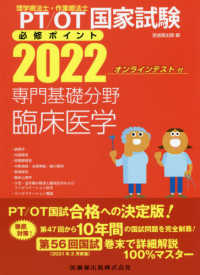- ホーム
- > 洋書
- > 英文書
- > Psychology
Full Description
The study of adult development and aging is a rapidly growing field, as the older adult population continues to increase. This handbook provides a comprehensive overview of adult development and aging, including theory and methods, biological factors and health, personality and individual differences, cognition, mental health and clinical issues, variability and diversity in development, and social and contextual factors.
Each chapter provides a state-of-the-art review of a different domain of adult development and aging and applies a lifespan developmental lens to the topic, addressing aspects of continuity and change in biopsychosocial processes across multiple aspects of adult development, with an emphasis on midlife and later adulthood. Distinguished scholars and researchers included in this handbook contribute a broad variety of perspectives, approaches, and methods, demonstrating the heterogeneity and diversity of adult development and aging. The volume provides foundational research and explication of theories as well as insight into current topics of growing importance within the field, such as alternative therapies including mindfulness and meditation; technology support for aging adults; the health of LGBTQ older adults; health inequities related to race, ethnicity, socioeconomic status, and other sociocultural factors; cultural variability in aging; and addressing ageism.
Contents
Part I. Theory and Methods
Chapter 1. Current Psychological Theories and Models of Aging
Susan T. Charles and Joseph A. Mikels
Chapter 2. Developmental Methodology: Macro Perspectives
Kevin J. Grimm and Matt L. Miller
Chapter 3. Understanding Development Over Micro-Timescales
Stacey B. Scott, Samantha S. Corley, and Kelly A. Romano
Chapter 4. Childhood Socioeconomic Antecedents of Adult Health and Aging in a Rapidly Changing World: Toward a Theoretically Rooted Actionable Knowledge
Thomas E. Fuller-Rowell and Colby Leonard
Chapter 5. Studying Adult Development and Aging the Long Way: 100 Years of U.S. Longitudinal Studies of Aging
Avron Spiro and Robert J. Waldinger
Chapter 6. Open Science, Replication, and Reproducibility in Psychological Aging Research: The Case of Emotion Research
Derek M. Isaacowitz and Hannah E. Wolfe
Part II. Biological Factors and Health
Chapter 7. Biological Aging
Tara Gruenewald
Chapter 8. Health-Promoting Behaviors and Lifestyles in Adulthood
Nicholas A. Turiano, Damaris Aschwanden, and Sarah J. Miller
Chapter 9. Age-Related Changes to Sensation and Perception
Jennifer L. Campos, Karen Z.H. Li, Natalie A. Phillips, M. Kathleen Pichora-Fuller, and Walter Wittich
Chapter 10. Stress and Biological Aging
Agus Surachman, Elissa Hamlat, and Elissa Epel
Chapter 11. Genetics and Epigenetics in Adulthood and Aging
Chandra A. Reynolds
Part III. Personality and Individual Differences
Chapter 12. Personality Change and Development in Adulthood
Daniel K. Mroczek, Eileen K. Graham, Tomiko Yoneda, and Jing Luo
Chapter 13. Psychosocial Factors and Health: Toward a Psychosocial Prescription for Healthy Aging
Margie E. Lachman and Shevaun D. Neupert
Chapter 14. Subjective Views of Aging
Manfred Diehl
Chapter 15. Motivation and Goal Development Across the Adult Lifespan: Goal Engagement, Disengagement, and Adjustment
Jutta Heckhausen, Carsten Wrosch, Jacob Shane, and Richard Schulz
Chapter 16. Emotion Regulation Across Adulthood: From Me to Us
Claudia M. Haase
Chapter 17. The Daily Stress of Adult Development
David M. Almeida, Jennifer Piazza, Jacquie Mogle, Kelly E. Cichy, and Robert S. Stawski
Part IV. Cognition
Chapter 18. Cognitive Changes in Adulthood and Aging
Christopher Hertzog
Chapter 19. Peering into the Mind of the Perceiver: Age Differences in Social Cognitive Abilities
Anne C. Krendl and Lucas J. Hamilton
Chapter 20. Wisdom and Age: A Complex Association
Ute Kunzmann
Chapter 21. Multiple Facets of Brain Aging: Associations With Age-Related Cognitive Changes
Lars Nyberg and Nina Karalija
Chapter 22. Neurocognitive Disorders, Alzheimer's Disease, and Related Disorders
Daniel A. Nation
Chapter 23. Cognitive Resilience and Reserve
Laura B. Zahodne and Kiana A. Scambray
Part V. Mental Health and Clinical Issues
Chapter 24. Genetic and Environmental Influences on Health in Adulthood and Aging
Robert F. Krueger, Colin D. Freilich, and Susan C. South
Chapter 25. Depression and Anxiety in Adulthood
Amy Fiske, Montgomery T. Owsiany, Amanda R. W. Steiner, and Julie Loebach Wetherell
Chapter 26. Deciphering Resilience: Disentangling its Core Elements, Conceptual Frameworks for its Study, and Promising Directions for Future Research
Frank J. Infurna and Nutifafa Eugene Yaw Dey
Chapter 27. Clinical Geropsychology
Rebecca S. Allen, Shayne S.-H. Lin, Timothy K. Ly, and Michael R. Buxton
Chapter 28. Alternative Therapies, Mindfulness, and Meditation
Paul Verhaeghen, Grazia Mirabito, and Shelley N. Aikman
Part VI. Variability and Diversity in Development
Chapter 29. Why Historical Context Matters for Adult Development and Aging
Johanna Drewlies, Nilam Ram, and Denis Gerstorf
Chapter 30. Variability and Diversity in Adult Development: Cross-Cultural Perspectives
Nicole Long Ki Fung, Hongmei Lin, Hanyu Zhang, and Helene H. Fung
Chapter 31. Racial/Ethnic Health Inequities in Middle-Aged and Older Adults
Adolfo G. Cuevas, Ruijia Chen, Danielle M. Krobath, Patrick J. Smith, Michael V. Stanton, Agus Surachman, and Haowei Wang
Chapter 32. Health and Well-Being in Queer Older Adults: Overcoming a Lifetime of Stigma
Toni L. Bisconti, Michael T. Vale, and Aimee Trunko
Part VII. Social and Contextual Factors
Chapter 33. Worker Aging and Retirement
Mo Wang, Zhefan Huang, Chengquan Huang, and Junhui Yang
Chapter 34. Close Ties, Weak Ties, and Social Integration Across Adulthood
Karen L. Fingerman, Nicole Richards, and Susan T. Charles
Chapter 35. A Cross-Cultural, Life Course Approach to Understanding Ageism
Liat Ayalon
Chapter 36. Family Caregiving: Theory, Research, and Practice
Steven H. Zarit and Allison R. Heid
Chapter 37. The Impact of Religion and Congregational Social Support on Well-Being and Mental Health in Adulthood and Old Age
Robert Joseph Taylor, Ann W. Nguyen, Meredith O. Hope, and Linda M. Chatters
Chapter 38. Loneliness: Age Differences in Measurement, Risk Factors, and Associations With Health
Louise C. Hawkley, Susanne Buecker, and Maike Luhmann
Chapter 39. Technology Support for Aging Adults
Sara J. Czaja and Walter R. Boot
Chapter 40. Aging in Context: A Synthesis of Accumulated Conceptualizations, Insights From Empirical Research, and Their Implications
Hans-Werner Wahl and Denis Gerstorf








